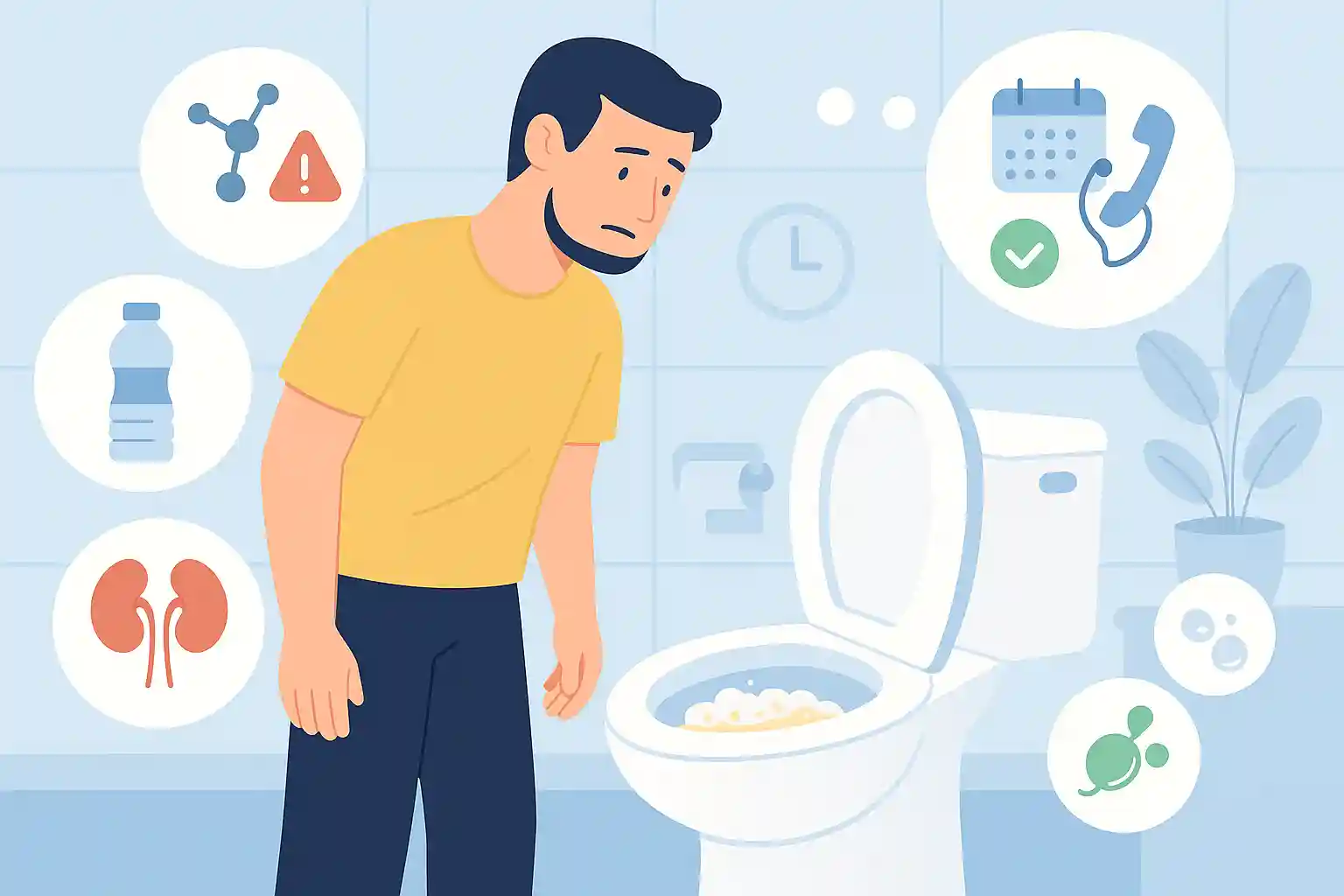Discovering foam in your urine can be alarming, but it's important to understand that foamy urine isn't always a cause for concern. While occasional foam is often completely normal, persistent foamy urine can sometimes indicate underlying health issues, particularly related to kidney function. Knowing when to worry and when to seek medical attention can help you make informed decisions about your health.
What Causes Foamy Urine?
Urine foam can result from various factors, ranging from completely harmless to medically significant:
Harmless Causes:
- Forceful urination that creates turbulence
- Dehydration leading to concentrated urine
- Rapid urination after holding it for a long time
- Toilet bowl cleaners or residual soap creating bubbles
- Normal variations in urine composition
- Recent vigorous exercise
Potentially Concerning Causes:
- Protein in urine (proteinuria) - most common serious cause
- Kidney disease or damage
- Urinary tract infections
- Diabetes complications
- High blood pressure effects on kidneys
- Certain medications
- Autoimmune conditions affecting kidneys
Understanding Proteinuria
The most medically significant cause of persistent foamy urine is proteinuria - the presence of excess protein in urine. Normally, healthy kidneys filter waste while keeping proteins in the bloodstream. When kidneys are damaged or not functioning properly, proteins can leak into the urine, creating foam.
Types of proteinuria include:
- Transient proteinuria: Temporary, often due to fever, exercise, or stress
- Orthostatic proteinuria: Occurs when standing, normal when lying down
- Persistent proteinuria: Ongoing protein loss, may indicate kidney disease
When to Be Concerned
While occasional foamy urine is usually nothing to worry about, certain signs warrant medical attention:
Red Flags Requiring Immediate Medical Attention:
- Persistent foamy urine lasting more than a few days
- Foam that doesn't dissipate after several minutes
- Foamy urine accompanied by swelling in face, hands, or feet
- Changes in urination frequency or volume
- Blood in urine or dark-colored urine
- Pain during urination or abdominal pain
Additional Symptoms to Watch For:
- Unexplained fatigue or weakness
- Nausea or vomiting
- Loss of appetite
- Shortness of breath
- High blood pressure
- Difficulty sleeping
- Muscle cramps
Risk Factors for Kidney Problems
Certain individuals are at higher risk for kidney-related causes of foamy urine:
- Diabetes (type 1 or type 2)
- High blood pressure (hypertension)
- Family history of kidney disease
- Age over 60
- Obesity
- Heart disease
- Previous kidney problems or infections
- Autoimmune diseases (lupus, etc.)
- Long-term use of certain medications
How to Distinguish Normal from Abnormal Foam
Understanding the characteristics of urine foam can help you assess whether it's concerning:
Normal Foam:
- Appears occasionally, not consistently
- Dissipates quickly (within a few seconds)
- Light, airy bubbles
- Occurs with forceful urination
- Goes away with increased water intake
Concerning Foam:
- Persistent and consistent appearance
- Dense, long-lasting foam
- Doesn't dissipate for several minutes
- Occurs even with gentle urination
- Continues despite adequate hydration
Diagnostic Tests Your Doctor May Order
If your doctor suspects kidney problems, they may recommend several tests:
- At home self-assessment with uACR test kit
- Urinalysis: Checks for protein, blood, and other abnormalities
- 24-hour urine collection: Measures total protein loss
- Blood tests: Assess kidney function (creatinine, BUN)
- Albumin-to-creatinine ratio: Measures protein leakage
- Blood pressure monitoring: Checks for hypertension
- Imaging studies: Ultrasound or CT scan if needed
- Kidney biopsy: In severe cases requiring tissue examination
Treatment Options
Treatment for foamy urine depends on the underlying cause:
For Harmless Causes:
- Increase water intake to stay well-hydrated
- Urinate more gently when possible
- Clean toilet bowl thoroughly to remove soap residue
- Monitor for changes over time
For Medical Conditions:
- Blood pressure medications (ACE inhibitors, ARBs)
- Diabetes management and blood sugar control
- Dietary modifications (reduced sodium, protein)
- Treatment of underlying infections
- Immunosuppressive drugs for autoimmune conditions
- Regular monitoring and follow-up care
Prevention and Kidney Health
Protecting your kidney health can help prevent serious causes of foamy urine:
- Stay adequately hydrated throughout the day
- Maintain healthy blood pressure levels
- Control blood sugar if diabetic
- Maintain a healthy weight
- Exercise regularly
- Limit alcohol consumption
- Avoid smoking
- Use medications as prescribed and avoid overuse of pain relievers
- Get regular check-ups, especially if you have risk factors
When to Schedule an Appointment
Consider seeing your healthcare provider if:
- Foamy urine persists for more than a week
- You notice any additional concerning symptoms
- You have risk factors for kidney disease
- The foam becomes more pronounced over time
- You're experiencing anxiety about the symptoms
- You haven't had a routine health check-up recently
The Bottom Line
Foamy urine is often benign and temporary, especially when it occurs occasionally or in specific circumstances like dehydration or forceful urination. However, persistent foamy urine, particularly when accompanied by other symptoms, can be an early sign of kidney problems that require medical attention.
The key is paying attention to patterns and additional symptoms. When in doubt, it's always better to consult with a healthcare provider for proper evaluation and peace of mind. Early detection and treatment of kidney problems can significantly improve outcomes and prevent progression to more serious conditions.
Remember that taking care of your overall health—through proper hydration, blood pressure control, diabetes management, and regular check-ups—is the best way to maintain healthy kidney function and prevent concerning symptoms like persistent foamy urine.
